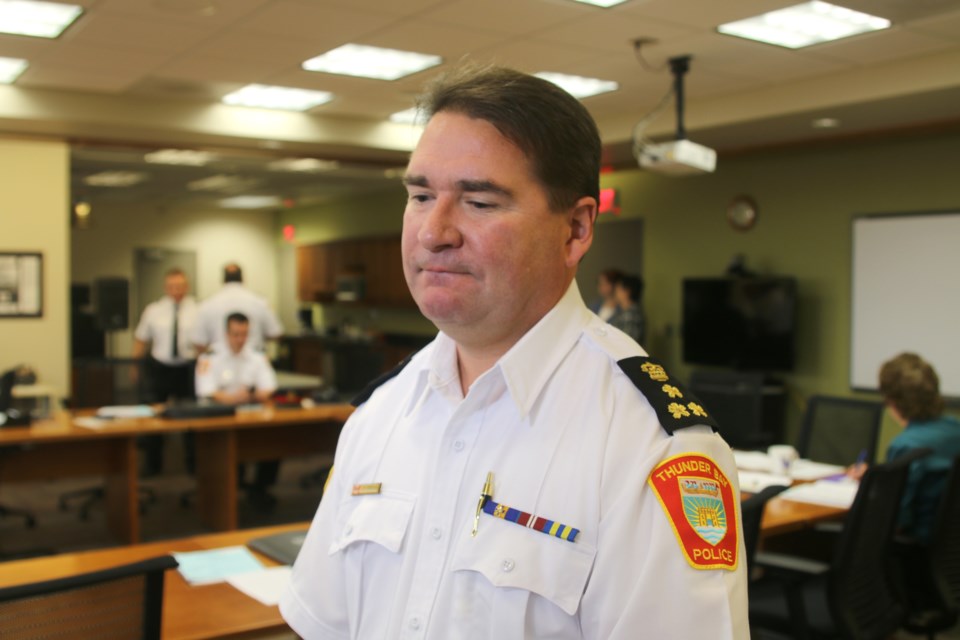THUNDER BAY – J.P. Levesque told Thunder Bay mayor Keith Hobbs about a criminal extortion allegation as an attempt to make the investigation go away, the Crown prosecutor accused, with the charged police chief disputing that notion as “beyond preposterous” and “insulting.”
During an often confrontational cross-examination of Levesque, Crown prosecutor Jason Nicol contended the police chief informed Hobbs of the impending probe was done out of concern of the mayor’s reaction and feeling “betrayed,” hoped Hobbs would stop whatever activity he might have been involved with and wanted to “bury the mess.”
“Your scheme, your plan, went sideways because the RCMP found out,” Nicol said.
Levesque, the Thunder Bay Police Service chief on trial against charges of obstructing justice and breach of trust for disclosing confidential information that Hobbs allegedly attempted to extort Sandy Zaitzeff, told Superior Court Justice Bonnie Warkentin it was insulting that he and other senior officers would be accused of intentionally conspiring to shut down an investigation.
“You’re smacking at some kind of cover-up here, which is just fiction,” Levesque said to the prosecutor.
Members of the Thunder Bay RCMP detachment met with Levesque, then-deputy chief Andy Hay and incoming deputy chief Sylvie Hauth on Dec. 14, 2016, where they told the city police leadership about the allegation against Hobbs. Levesque testified he was told by the RCMP the investigation would be turned over to the Thunder Bay police, as the agency with jurisdiction.
Levesque told the court he had assigned Insp. Don Lewis, currently the acting deputy chief, to review case material including a video and statement that the RCMP said they possessed but did not immediately turn over to Thunder Bay police.
Nicol questioned why the city police force would review an allegation against Hobbs, a retired officer and past president of the Thunder Bay Police Association.
It was a crystal clear conflict of interest for the Thunder Bay Police Service to be involved, the prosecutor levelled.
“How in the world could you fail to understand the optics in play?” Nicol asked. “You shouldn’t have touched this case with a 10-foot pole.”
Levesque, who said there were discussions about referring the case to the OPP immediately following that meeting, replied it was standard practice for the service to review an allegation before handing it off to an outside agency.
On Dec. 21, 2016, Levesque met with Hobbs privately in his office at the Balmoral Street police station where he told the mayor that an acquaintance of Zaitzeff, the prominent lawyer charged with numerous offences including sexually related charges involving a minor, had brought a complaint to the RCMP.
Levesque, who was beginning a three-week vacation the next day, said he felt it was his obligation and “in the best interests of our service, city, and municipality” to tell the mayor.
In particular, Levesque was concerned about Hobbs discovering the existence of the investigation inadvertently either through a police leak, social media or traditional media, especially as a week had passed without the RCMP passing along the case materials. The police chief said he wanted to protect against how the mayor, a man he described the previous day as “unpredictable” and volatile,” could react to the news, including contacting individual officers to try to get information.
Based on the “short conversation” with Hobbs, Levesque testified it was apparent the mayor already knew something was going on and Hobbs correctly guessed the identity of the complainant. The next day, Levesque received a call from the RCMP who were concerned there had been a leak. The police chief informed the Mounties he was the one who told the mayor and apologized for not letting them know sooner.
“The only person leaking information was you,” Nicol said. “You’re the one creating the very problem you feared.”
In addition to revealing the existence of the investigation to Hobbs, Nicol charged that Levesque was out of line for bringing the matter to the attention of city manager Norm Gale and police services board chair Jackie Dojack.
Nicol demanded Levesque identify the legislation that gave the police chief the ability to decide non-police personnel – let alone a suspect or person of interest – could be told about a criminal investigation.
Levesque said while there are policies and legislation against releasing confidential information, there were provisions where it could be done if otherwise authorized. It may come across as arrogant, Levesque conceded, but he said he authorized himself to breach confidentiality.
“I’m suggesting to you that is ridiculous,” Nicol said. “You can’t authorize yourself to break the law.”
In January, the RCMP informed Thunder Bay police the investigation would be bypassed to the OPP. Levesque admitted he was “slightly relieved” when he learned provincial police would be taking over.
Ultimately, the OPP charged Hobbs and his wife Marisa each with extortion and obstructing justice on July 21. As well, Mary Voss was charged with one count of extortion in connection to the investigation.
The charges against Hobbs and Zaitzeff have not been proven in court.
The Levesque trial resumes on Monday when the defence is expected to call their second and final witness.
